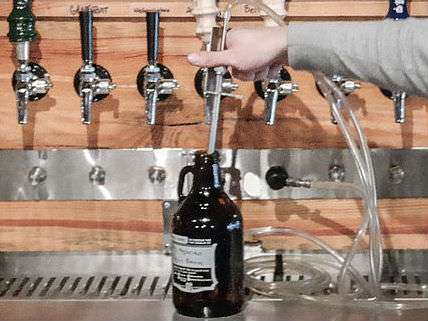Lawsuit Targets Idiotic Florida Ban on Beer Growlers
When it comes to the enforcement of irrational economic regulations, Florida is in a league of its own. In 1994, Florida became the first state to require interior designers to obtain a government-issued occupational license. Why? State officials initially tried to claim it was a health and safety measure, but several years later, when the matter was approaching trial, the state was forced to stipulate that "neither the defendants nor the state of Florida have any evidence that the unregulated practice of interior design presents any bona fide public welfare concerns."
Now Florida is attempting to enforce an equally bogus regulation: a state law prohibiting the sale of the popular 64-ounce beer containers known as "growlers." And once again, the state's nonsensical law fails to advance any sort of legitimate government interest.

Those failings were driven home today by a federal lawsuit filed by the Pacific Legal Foundation on behalf of of the Crafted Keg, a Florida business that specializes in selling craft beer via growlers. "The 64-ounce growler is the craft brew industry standard, allowed nearly everywhere—but not in Florida," the lawsuit observes. "In a state that depends on tourism, being out of step with the rest of the country costs craft beer businesses money. The law is irrational."
To survive judicial review under existing Supreme Court precedent, economic regulations such as Florida's growler ban must pass what's known as the rational-basis test. In effect, this test tells the courts that they may strike down a contested law only if it lacks any conceivable connection to a legitimate government interest.
To be sure, that is a highly deferential approach to government regulation. But the Florida growler ban is so moronic it fails to satisfy even the generous terms of the rational-basis test.
After all, what possible legitimate state interest could this ban serve? It certainly cannot be part of some regulatory scheme designed to limit beer consumption and thereby curb public intoxication or drunk driving. That sort of scheme would only be rational if the state also banned six packs, kegs, and other large-size offerings. The fact that customers may purchase 72-ounces of beer via six pack but not a 64-ounce growler of the same beer highlights the fundamental irrationality of this preposterous regulation.
